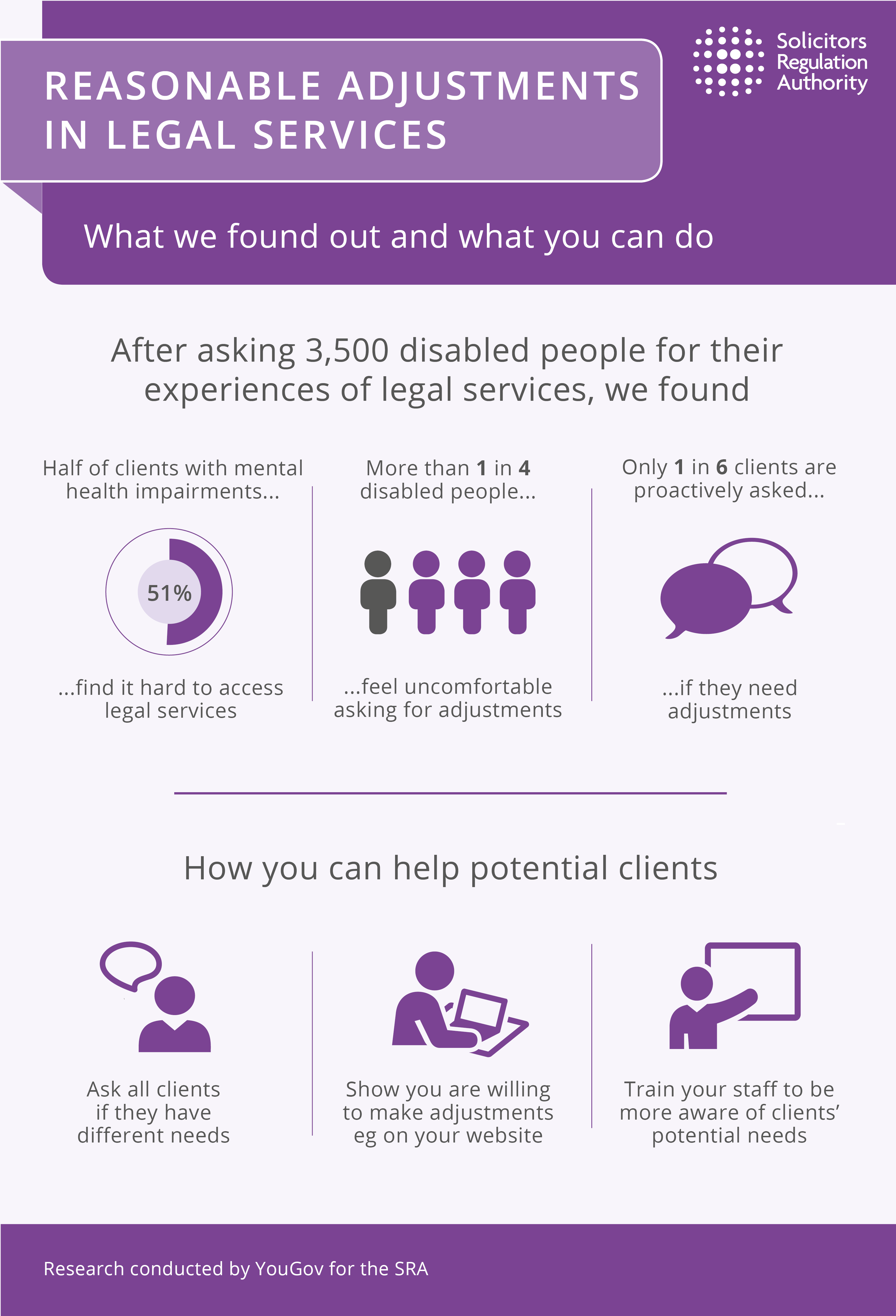Reasonable adjustments in the provision of legal services
10 October 2019
Background
The Competition and Markets Authority reported in 2016 that one of the major barriers to accessing and understanding legal services was a general lack of accessibility, particularly in how information is presented and shared.
Charities such as Citizens Advice and Age UK have suggested that this is of particular concern regarding people who, due to mental or physical disabilities, might face heightened challenges.
Disability affects 13.9 million people in the UK and most of these disabilities are not visible. For example, only 8 percent of disabled people in the UK use a wheelchair. And 39 percent of disabled people have stamina, breathing or fatigue difficulties, and 24 percent have mental health impairments.
Solicitors and law firms have duties under the Equality Act 2010 and the Code of Conduct to treat people fairly and without discriminating against them on the grounds of protected characteristics including disability.
We commissioned YouGov to explore what reasonable adjustments law firms could offer to make sure their services are more accessible for disabled people.
As part of this they surveyed more than 3,500 disabled people through a combination of online surveys, one-to-one interviews and online forums. A workshop was also held with a number of local and national charities.
Key findings
The most common issues disabled people raised about accessing legal services were:
- Almost three quarters were rarely or never proactively asked if they needed adjustments when accessing professional services.
- The most common barriers to services being accessible were unhelpful staff and the disabled person’s own anxiety or lack of confidence.
- Those with less visible impairments, such as mental health and learning or social disabilities, face a different and more challenging experience in accessing information and services to those with more visible impairments.
Improvements law firms could make
After identifying the main barriers disabled people can face when needing to access legal services, our research then explored and tested potential changes law firms could introduce to address these.
Some of the most common improvements suggested by disabled people and stakeholders include:
- have an easy-to-navigate and accessible website, with a dedicated section for those with disabilities
- promote the fact they offer reasonable adjustments - this would increase the likelihood that a disabled person would choose to use the firm in the first place
- include a photo of their office on their website to help potential visitors consider access issues before visiting them
- highlight if any of their staff have specific training in working with customers with disabilities, or if the firm has any accreditations or relationships with disability charities
- make sure all communications are as accessible as possible in terms of language, presentation and format - for example, use font of at least 14 point-size in all printed materials or letters.
Overall, once disabled people have hired a solicitor, their impression of the service they received was found to be positive.
The biggest single factor that influences this satisfaction with the service is the attitudes of the staff within a solicitors’ firm towards a disabled client. Flexible and understanding staff who make disabled people feel comfortable (in whatever way that might be) is highly appreciated.
Other improvements our research suggested that firms should consider included:
- Proactively asking all clients if they need any reasonable adjustments to be made. They should not make assumptions based on appearances, or the fact they do not raise the subject themselves.
- Training all staff in understanding and identifying potential issues that disabled people might face.
What we will do with these findings
As well as promoting the recommendations in this report to firms, we will also feed the intelligence into our wider work on improving access to legal service for people from all backgrounds.
As part of our new Standards and Regulations, which are to be introduced on 25 November, we are also developing best practice guidance on topics such as working with clients with mental capacity issues.

